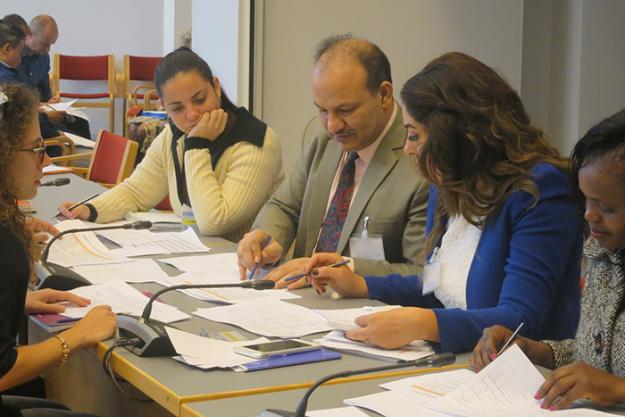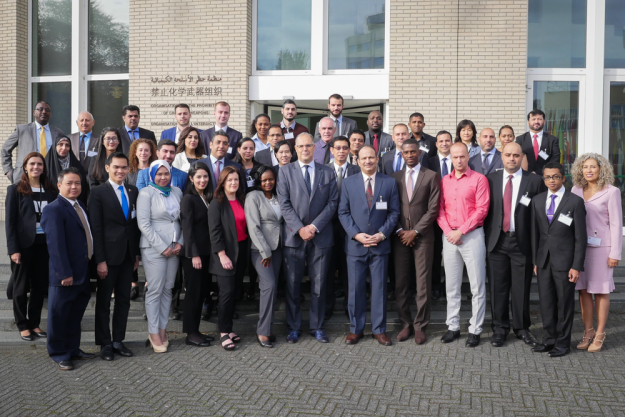
Representatives of OPCW Member States during an advanced training course in The Hague.
THE HAGUE, Netherlands — 18 September 2018 — Representatives of 31 Member States of the Organisation for the Prohibition of Chemical Weapons (OPCW) gained deeper understanding of the procedures concerning declarations and inspections obligations during an advanced training course held on 10—14 September in The Hague.
The 37 participants included representatives of National Authorities and, for the first time, of chemical industry and other as stakeholders critical to the national implementation of declaration and inspection requirements from Article VI of the Chemical Weapons Convention (CWC).
In his opening remarks, the Director of International Cooperation and Assistance Division, Mr Hamza Khelif, stressed that, “the importance of the full and effective implementation of Article VI of the Convention is ever-growing in terms of the effectiveness of the CWC regime and in ensuring the peaceful use of toxic chemicals”.
This training offered detailed knowledge on the declarations and inspections process, and included demonstrations of the Electronic Declarations for National Authorities (EDNA) software and the Secure Information Exchange (SIX) platform.
The declaration exercises addressed practical approaches to the challenges faced by National Authorities. Another exercise, implemented in co-operation with the National Authority of the Netherlands, took the participants on a mock OPCW inspection at a LyondellBasell chemical plant in Rotterdam.
The participants drafted follow-up plans detailing how they will utilise the knowledge and experiences gained during the training to improve implementation of the Convention in their home countries.
Representatives of the following OPCW Member States participated in the event: Albania, Angola, Argentina, Bangladesh, Bosnia and Herzegovina, Brazil, Cambodia, Cuba, Democratic Republic of the Congo, Fiji, France, Grenada, Guatemala, India, Iran, Iraq, Ireland, Italy, Kenya, Madagascar, Malaysia, Maldives, Myanmar, Pakistan, Palestine, Philippines, Qatar, Switzerland, Thailand, The Former Yugoslav Republic of Macedonia, and Ukraine.
This was the first OPCW capacity-building event with the participation of the State of Palestine, the newest State Party to the CWC.

Background
Ninety-eight percent of the world’s chemical industry falls under the OPCW verification regime of the Chemical Weapons Convention.
As of the end of 2017, 92 OPCW Member States submitted declarations for declarable facilities or activities for 2016, involving over 5,000 sites. The number of inspected industrial sites thus exceeded that of chemical weapon-related sites which totaled 3,190.
The Technical Secretariat of the OPCW since its establishment has conducted 3,726 inspections of industrial sites to verify that the production and use of chemicals are intended solely for peaceful purposes.
As the implementing body for the Chemical Weapons Convention, the OPCW, with its 193 Member States, oversees the global endeavour to permanently eliminate chemical weapons. Since the Convention’s entry into force in 1997, it is the most successful disarmament treaty eliminating an entire class of weapons of mass destruction.
Over 96% of all chemical weapon stockpiles declared by possessor States have been destroyed under OPCW verification. For its extensive efforts in eliminating chemical weapons, the OPCW received the 2013 Nobel Peace Prize.
